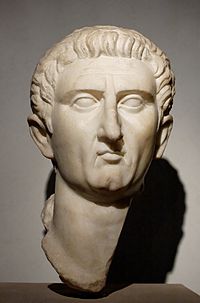Nerva
| Nerva | |||||
|---|---|---|---|---|---|
| Emperor of the Roman Empire | |||||
 Bust of Nerva | |||||
| Reign | September 18 96- 27 January 98 | ||||
| Predecessor | Domitian | ||||
| Successor | Trajan | ||||
| Burial | Mausoleum of Augustus, Rome | ||||
| Issue | Trajan (adoptive) | ||||
| |||||
| Dynasty | Nervan-Antonine | ||||
| Roman imperial dynasties | ||||||||||||||
|---|---|---|---|---|---|---|---|---|---|---|---|---|---|---|
| File:Nerva Bust.jpg | ||||||||||||||
| Nerva–Antonine dynasty (AD 96–192) | ||||||||||||||
| Chronology | ||||||||||||||
|
||||||||||||||
| Family | ||||||||||||||
| Succession | ||||||||||||||
|
||||||||||||||
Marcus Cocceius Nerva (November 8, 30[1] –January 27, 98) was a Roman Emperor (96-98). He was the first emperor to select his successor by their capabilities and potential, rather than paternal relations (through adoption). This practice led to a line of Emperors that is known as the "Five Good Emperors".
Life
Early life
Marcus Cocceius Nerva was a member of the Italian nobility rather than one of the elite of Rome; in this he was like Vespasian, the founder of the Flavian dynasty. Nerva was born in Narni, Umbria, 50 miles north of Rome, on November 8, 35 AD.
Members of his family had held high office; his great-grandfather was consul in 36 BC, and his grandfather was in the imperial entourage at the time of Nerva's birth. Nerva was connected with the Julio-Claudian dynasty, as his uncle Octavius Laenas had married Rubellia Bassa, the great-granddaughter of Tiberius.
Nerva was the first of the Five Good Emperors, and the last emperor who was Italian both by family and by birth. He had not pursued the usual administrative career, although he had been consul with Vespasian in 71 and with Domitian in 90.
Emperor
After Domitian's assassination in 96 following his reign of terror, Nerva was elevated to emperor on September 18, 96. The Fasti Ostienses, the Ostian Calendar, records "Fourteenth day before Kalends of October: Domitian killed. On the same day, Marcus Cocceius Nerva proclaimed emperor." According to Cassius Dio he was approached by the conspirators against Domitian because he was elderly (61) and childless - that is, a safe pair of hands. This also had the effect of saving his own life, which was under threat from Domitian.
After his accession, Nerva went to set a new tone: he released those imprisoned for treason, banned future prosecutions for treason, granted amnesty to many whom Domitian had exiled, restored much confiscated property, and involved the Roman Senate in his rule. He probably did so as a means to remain relatively popular (and therefore alive), but this did not completely aid him. Support for Domitian in the army remained strong, and in October 97 the Praetorian Guard laid siege to the Imperial Palace on the Palatine Hill and took Nerva hostage. He was forced to submit to their demands, agreeing to hand over those responsible for Domitian's death and even giving a speech thanking the rebellious Praetorians. Petronius and Parthenius, blamed by the Praetorians for Domitian's death, were killed. Nerva was unharmed in this assault, but his authority was damaged beyond repair. He had no natural children, but found salvation in the idea of adopting someone who would have the support of both the army and the people. He adopted Trajan, a commander of the armies on the German frontier, as his successor shortly thereafter in order to bolster his own rule. Casperius Aelianus, the Guard Prefect responsible for the mutiny against Nerva, was later executed under Trajan.
The Epitome de Caesaribus reports that Nerva was struck by a fever and chills and died shortly afterwards; Jerome places his death in the Gardens of Sallust in Rome (originally developed by the historian Sallust). He was deified by the Senate shortly afterwards, and his ashes were laid to rest in the Mausoleum of Augustus. On the day of his burial there was a solar eclipse.
He was responsible for the construction a small Imperial Forum, situated immediately adjacent to the Forum of Augustus. Little remains, partly because the Via dei Fori Imperiali cuts across it. Archeological excavation started on this forum in 1999, and continues to the present (2006)
Statues
- An ancient bronze equestrian statue of Domitian, now on display at Misenum, had its face reworked into that of Nerva. This change was fairly common. The Senate issued a damnatio memoriae on Domitian to obliterate him from all public record. Thus many of the images of Nerva used converted statues that had been made for his predecessor.
- There is an equestrian statue of Nerva astride a horse at Gloucester, England at the entrance to Southgate Street.
- There is a statue of Nerva also at Narni town in Italy at Cocceio Nerva street.
References
External links
![]() Media related to Nerva at Wikimedia Commons
Media related to Nerva at Wikimedia Commons
Notes
- ^ "Aurelius Victor records the year as 35 (Caes. 12.11), Dio (68.4.4) as 30. The latter has been more widely accepted." (Wend, n. 2)
